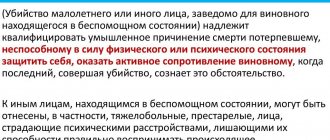New edition of Art. 10 of the Criminal Code of the Russian Federation
1. A criminal law that eliminates the criminality of an act, mitigates punishment or otherwise improves the position of a person who committed a crime, has retroactive effect, that is, it applies to persons who committed the relevant acts before the entry into force of such a law, including persons serving a sentence or those who have served their sentence but have a criminal record. A criminal law that establishes the criminality of an act, increases punishment or otherwise worsens a person’s position does not have retroactive effect.
2. If a new criminal law mitigates the punishment for an act that is being served by a person, then this punishment is subject to reduction within the limits provided for by the new criminal law.
General information
According to Art. 10 of the Criminal Code, if the law softens the sanction, eliminates the criminality of the act, improves the position of the subject who committed the attack, it is given retroactive force. Its provisions apply to citizens involved in the relevant crime until it comes into effect. These include, among other things, persons who are serving a sentence or have already served it, but their criminal record has not been expunged.
If a law establishes the criminality of an act, strengthens a sanction, or worsens a citizen’s position, it does not have retroactive force.
As Part 2 of Article 10 establishes, if the provisions of the law soften the sentence that a person is serving, then it must be reduced within the limits established by the new legal act.
The Supreme Court clarified whether the management company should continue to service the house when it is excluded from the register of licenses
In Determination No. 303-ES20-23313 of April 19, the Supreme Court clarified whether a management organization that has excluded information about an apartment building from the register of licenses should continue to manage it until a new management company appears.
LLC Management Company "Dersu" won the competition to select a management organization to manage an apartment building, entered into an appropriate agreement for a period of one year with the possibility of its extension on the same terms and for the same period in the absence of a statement from one of the parties to terminate it. After a year, the management company decided to exclude the MKD from the register of licenses. She managed the house until July 1, 2022.
On August 13, 2022, based on the results of an unscheduled documentary inspection, the housing inspection drew up an act stating that after making changes to the register of licenses of the Dersu Management Company, it does not manage apartment buildings, does not maintain and repair the common property of the owners in the house, does not send payment documents, In connection with this, it issued an order on the obligation to continue to carry out activities related to the management of an apartment building until the day of the occurrence of the event provided for in Part 3 of Art. 200 of the Housing Code, that is, before the choice of another management company, management of apartment buildings by the owners of premises or state registration of a homeowners' association or housing cooperative.
Dersu appealed to the Arbitration Court of the Primorsky Territory, which agreed with the position of the housing inspectorate that if information about an apartment building is excluded from the register of licenses of a constituent entity of the Russian Federation, the licensee is obliged to properly fulfill the duties of managing the apartment building, providing services and (or) performing work for the maintenance and repair of common property in an apartment building in accordance with the requirements of the law until the day of the occurrence of the mentioned circumstances specified in Part 3 of Art. 200 housing complex of the Russian Federation. The appeal and cassation left the decision of the first instance unchanged.
Disagreeing with the conclusions of the courts, the management company filed a complaint with the Supreme Court. The Supreme Court noted that the exclusion of information about MKD from the register of licenses in accordance with Part 6 of Art. 198 of the Housing Code is the basis for the licensee to terminate the activities of managing such a house in the manner established by Art. 200 Code.
From the date of exclusion of information, the licensee has no right to carry out activities related to the management of apartment buildings, including charging and collecting fees for residential premises and utilities, issuing payment documents to consumers, except for the cases provided for in Part 3 of Art. 200 LCD. In accordance with this provision, the licensee is obliged to properly fulfill the duties of managing the apartment building, providing services or performing work on the maintenance and repair of common property in accordance with the requirements of the law until the day:
1. occurrence in accordance with Part 7 of Art. 162 of the Code of Obligations for the management of such a house from a management organization selected by the general meeting of owners of premises in an apartment building or selected based on the results of an open competition held by a local government body;
2. the occurrence of obligations under the management agreement of the apartment building, concluded by the management organization with the homeowners’ association, housing cooperative or other specialized consumer cooperative;
3. occurrence of obligations under the contracts specified in parts 1 and 2 of Art. 164 Code;
4. state registration of a homeowners’ association, housing cooperative or other specialized consumer cooperative.
“The above legal provisions do not impose on other licensees, in particular, upon whose applications changes were made to the register of licenses in connection with the termination of the management agreement at the end of its validity period, the responsibility for managing an apartment building after making appropriate changes to the register of licenses,” the Supreme Court said.
Art. 10 of the Criminal Code of the Russian Federation with comments
The retroactive force of a legal act is considered an exception to the rule regarding the validity of the law in time. The existence of such a norm is one of the manifestations of humanism.
Application of Art. 10 of the Criminal Code is possible if the perpetrator commits an act under one law, but is held accountable under another legal act.
If the provisions of the latter are aimed at improving the situation of the subject, judicial and investigative workers must apply them. In this case, the time of the commission of the act does not matter.
For example, after the introduction of the new Criminal Code in 1996, some acts were decriminalized. In particular, liability was not provided for failure to report a crime, violation of the order of departure, residence in the border zone, sabotage, and so on.
For how many years will a foreigner convicted under Part 2 of Article 18.10 of the Code of Administrative Offenses of the Russian Federation be deported?
Good afternoon. For how many years will a foreigner convicted under Part 2 of Article 18.10 of the Code of Administrative Offenses of the Russian Federation be deported?
Lawyer Antonov A.P.
Good afternoon
According to Article 3.10 of the Code of Administrative Offenses, administrative expulsion from the Russian Federation of foreign citizens or stateless persons consists of the forced and controlled movement of these citizens and persons across the State Border of the Russian Federation outside the Russian Federation (hereinafter referred to as forced expulsion from the Russian Federation) , and in cases provided for by the legislation of the Russian Federation - in the controlled independent departure of foreign citizens and stateless persons from the Russian Federation. Administrative deportation from the Russian Federation as a measure of administrative punishment is established in relation to foreign citizens or stateless persons and is appointed by a judge, and if a foreign citizen or stateless person commits an administrative offense upon entry into the Russian Federation - by the relevant officials. Administrative expulsion from the Russian Federation cannot be applied to military personnel who are foreign citizens. When imposing an administrative penalty in the form of administrative deportation from the Russian Federation of a foreign citizen or stateless person, the judge makes a decision on his forced deportation from the Russian Federation or controlled independent departure from the Russian Federation. In order to execute the administrative punishment imposed on a foreign citizen or stateless person in the form of forced deportation from the Russian Federation, the judge has the right to impose on such persons detention in a special institution provided for by Federal Law of July 25, 2002 N 115-FZ “On the Legal Status of Foreign Citizens in Russian Federation". Administrative punishment in the form of controlled independent departure from the Russian Federation may be imposed on a foreign citizen or stateless person in the event of administrative expulsion from the Russian Federation at the expense of such foreign citizen or stateless person or at the expense of the body that invited them, a diplomatic mission or consular an institution of a foreign state, the citizen of which is the expelled foreign citizen, an international organization or its representative office, an individual or legal entity specified in Article 16 of the Federal Law of July 25, 2002 N 115-FZ “On the Legal Status of Foreign Citizens in the Russian Federation.” According to Article 27 of the Federal Law “On the procedure for leaving the Russian Federation and entering the Russian Federation,” entry into the Russian Federation is not permitted to a foreign citizen or stateless person if: - in accordance with the Constitution of the Russian Federation to the extent that they are aimed at protecting health as a constitutionally significant value and for these purposes provide for the possibility of making in relation to a foreign citizen or stateless person who has been diagnosed with an infectious disease that poses a danger to others, a decision on the undesirability of his stay (residence) in the Russian Federation in the event of refusal or evasion of such a foreign citizen or stateless persons from treatment, as well as their violation of the established procedure for treatment, entailing a real threat to public health; - do not comply with the Constitution of the Russian Federation to the extent that in the system of legal regulation of relations regarding the adoption of a decision on the undesirability of a foreign citizen or stateless person staying (residing) in the Russian Federation due to the presence of an infectious disease that poses a danger to others, these provisions create insurmountable obstacles to the entry of such a foreign citizen or stateless person into the Russian Federation - regardless of the fact of his subsequent documented recovery from this infectious disease 1) this is necessary in order to ensure the defense capability or security of the state, or public order, or the protection of public health, for except for the cases provided for in paragraph two of paragraph 3 of Article 11 of the Federal Law of March 30, 1995 N 38-FZ “On preventing the spread of the disease caused by the human immunodeficiency virus (HIV infection) in the Russian Federation”; 2) in relation to a foreign citizen or stateless person, a decision has been made on administrative expulsion from the Russian Federation, on deportation or transfer by the Russian Federation to a foreign state in accordance with the international treaty of the Russian Federation on readmission - within five years from the date of administrative expulsion from the Russian Federation Federation, deportation or transfer by the Russian Federation to a foreign state in accordance with the international treaty of the Russian Federation on readmission; 2.1) in relation to a foreign citizen or stateless person, a decision was made repeatedly (two or more times) on administrative expulsion from the Russian Federation, on deportation or transfer by the Russian Federation to a foreign state in accordance with the international treaty of the Russian Federation on readmission - within ten years from the date of administrative expulsion from the Russian Federation, deportation or transfer by the Russian Federation to a foreign state in accordance with the international treaty of the Russian Federation on readmission; 2.2) during the previous stay in the Russian Federation, the readmission procedure for a foreign citizen or stateless person was terminated in accordance with Article 32.5 of the Federal Law “On the Legal Status of Foreign Citizens in the Russian Federation” - within three years from the date of departure from the Russian Federation ; 3) a foreign citizen or stateless person has an unexpunged or outstanding criminal record for committing an intentional crime on the territory of the Russian Federation or abroad, recognized as such in accordance with federal law; 4) a foreign citizen or stateless person has not submitted the documents required to obtain a visa in accordance with the legislation of the Russian Federation - before their submission; 5) a foreign citizen or stateless person has not submitted a health insurance policy valid on the territory of the Russian Federation - before its submission, with the exception (on the basis of reciprocity) of employees of diplomatic missions and consular offices of foreign states, employees of international organizations, family members of these persons and other categories of foreign citizens; 6) when applying for a visa or at a checkpoint across the State Border of the Russian Federation, a foreign citizen or stateless person was unable to confirm the availability of funds for living on the territory of the Russian Federation and subsequent departure from the Russian Federation or provide guarantees for the provision of such funds in accordance with the procedure established authorized federal executive body; 7) in relation to a foreign citizen or stateless person, a decision has been made that it is undesirable to stay (reside) in the Russian Federation, including if this citizen is included in the list of citizens of the United States of America who are prohibited from entering the Russian Federation; 9) a foreign citizen or stateless person used false documents; 10) a foreign citizen or stateless person, during his previous stay in the Russian Federation, evaded paying a tax or an administrative fine or did not reimburse the costs associated with administrative expulsion from the Russian Federation or deportation - until the corresponding payments have been made in full. The procedure for repayment by foreign citizens and stateless persons of such debt is determined by the Government of the Russian Federation; 11) a foreign citizen or stateless person has been repeatedly (two or more times) within one year brought to administrative responsibility for committing an administrative offense related to an encroachment on public order and public safety or violation of the regime of stay (residence) of foreign citizens or stateless persons citizenship in the Russian Federation or the procedure for carrying out labor activities on the territory of the Russian Federation - within five years from the date of entry into force of the last resolution on bringing to administrative responsibility; 12) a foreign citizen or stateless person during his previous stay in the Russian Federation exceeded the period of stay of ninety days in total during each period of one hundred and eighty days - within three years from the date of departure from the Russian Federation; 13) a foreign citizen or stateless person did not leave the Russian Federation during his previous stay in the Russian Federation and stayed in the Russian Federation continuously for more than one hundred and eighty days, but not more than two hundred and seventy days from the date of expiration of the period of temporary stay in the Russian Federation provided for by federal law , - within five years from the date of departure from the Russian Federation; 14) a foreign citizen or stateless person did not leave the Russian Federation during his previous stay in the Russian Federation and stayed in the Russian Federation continuously for more than two hundred and seventy days from the date of expiration of the period of temporary stay in the Russian Federation provided for by federal law - for ten years from day of departure from the Russian Federation. If the entry into the Russian Federation of a foreign citizen or stateless person is limited on the grounds provided for in subparagraphs 2, 2.1, 2.2, 3 and 7 of part one of this article, the border authorities of the federal security service and the federal executive body in the field of internal affairs or its territorial body in in cases established by the Government of the Russian Federation, puts a corresponding mark in the identity document of a foreign citizen or stateless person. A foreign citizen or stateless person who is not allowed to enter the Russian Federation on one of the grounds provided for in part one of this article, entry into the territory of the Russian Federation is permitted if there is written confirmation from the federal executive body in the field of internal affairs about the application against the specified foreign citizen or a stateless person, the readmission procedure indicating the date and intended checkpoint across the State Border of the Russian Federation. Thus, the period of administrative deportation is 5 years.
Sincerely, lawyer Anatoly Antonov, managing partner of the law firm Antonov and Partners.
Still have questions for your lawyer? Ask them right now here, or call us by phone in Moscow +7 (499) 288-34-32 or in Samara +7 (846) 212-99-71 (24 hours a day), or come to our office for a consultation (by pre-registration)!
Exceptions
The legal status of the subject, according to Art. 10 of the Criminal Code cannot worsen if, after the crime committed by him, a new law was introduced that tightened the punishment. In such situations, the previous normative act in force at the time of the act is applied. Thus, the provisions of the previous Code on violation of privacy, illegal receipt of credit funds, unlawful actions in the event of bankruptcy in relation to crimes committed before 01/01/1997 do not have retroactive force. This is due to the fact that the 1960 law did not establish penalties for these deeds.
Change in production volume under 44-FZ
16.10.2019
From this article you will learn:
- Why can’t the scope of construction work be changed in contracts concluded before July 1, 2022?
- Why is it impossible to change the volume of purchased products in a contract concluded as a result of a request for quotations in electronic form?
- How to correctly change the quantity of goods supplied under a contract?
- What is the distinctive feature of contracts for the supply of goods and performance of work (provision of services) when deciding on a change in volume?
- How can not only the customer, but also the supplier, be hit with administrative fines associated with changes in volume?
- What are the features when purchasing from a single supplier?
- and much more interesting information about the quantity (volume) of products purchased under Law No. 44-FZ.
Are we interested in you? Then make yourself comfortable in front of the screen and read this article to the end. After reading, do not forget to leave your review (comment), and also join our closed WhatsApp group to receive advice from the experts of our consultation center!
Eliminating the crime of the crime
In the provisions of Art. 10 of the Criminal Code uses several specific concepts. One of them is to eliminate the criminality of the crime.
A law decriminalizing an assault is a legal act in accordance with which an act that was previously a crime ceases to be such. It is relegated to the category of disciplinary, administrative, immoral, civil offenses, or is not mentioned at all or is encouraged by legal norms.
Provisions of the law that eliminate the criminality of an act can exclude from the Criminal Code the article establishing punishment for it, change the disposition of the norm, introduce new elements into it, only in the presence of which the subject can be held accountable.
In addition, decriminalization can be carried out by introducing new norms into the General Part of the Criminal Code. For example, they can establish previously unknown or expand traditional conditions that exclude crime. The rules may also provide grounds for releasing a person from liability that were not previously enshrined in law.
What criminal law has this force?
The second part of Article 10 of the Criminal Code of the Russian Federation directly indicates reductions in the punishment already imposed by the court when the law is changed.
Doubts arise if the new law contains both measures mitigating the sentence and tightening additional sanctions. Then they talk about the partial retroactive force of the law.
In general terms, it looks like this: A. Accused of a crime for which at the time of the act he could have been given 4 to 6 years of restriction of freedom. In the process of investigative measures under the newly adopted version of the law, he may be given a sentence of 2.5 to 9 years. The court, when making a decision, may reduce the lower limit to 2.5 years, but the upper limit will remain at 6 years.
The numerous complaints from convicts about the incorrect use of the rule of law during the review of their cases led to the adoption of Resolution of the Constitutional Court of April 20, 2006 No. 4-P. The goal was to check compliance with the Constitution of the Russian Federation, Part 2 of Art. 10 of the Criminal Code of the Russian Federation. Takes into account frequently occurring, widespread problems, the general issue of which is related to the application of Part 1 of Art. 10 of the Criminal Code of the Russian Federation, an explanation is given for its law enforcement practice.
It is easy to understand which criminal laws of the country have retroactive effect for convicted citizens. All sentences are subject to revision if the articles used in them are changed in the direction of improving the situation of the convicted person or reducing the term.
The applicant applies to a court of general jurisdiction. The essence of the appeal is to bring the sentence passed in accordance with the version of the Criminal Law in force at the time of filing the appeal, and not at the time of its delivery. However, when making a verdict in a case, the court takes into account two sides of the process. Restriction of freedom is a measure of punishment necessary to restore justice and atone for guilt. Punishment cannot be reduced so much that it loses its meaning.
Review of the case by cassation or appeal leads to a mandatory investigation by the court of the issue of adopting a new version of the article of the law.
It can manifest itself in different aspects:
- exempt from punishment, since the crime has ceased to be criminal. Occurs as determined by the court. Jurisdiction is determined by the place of actual residence of the person. The initiator is both the convict himself and the prosecutor, the supervisory commission of the administration of the correctional institution;
- release from punishment for the reason that the term of imprisonment served is higher than the maximum possible under the specified article in the new version of the law;
- replacing the conditions of serving a sentence with more lenient ones, for example, by introducing the concept of deferment due to the presence of a young child;
- the emergence of grounds for changing the measure of responsibility from actual deprivation of liberty to others;
- expansion of parole conditions;
- reduction of criminal record.
In practice, court decisions turn out to be complex and unpredictable. The most acute question arises if the new article contains both a promise to mitigate the punishment and to increase it.
Mitigation of punishment
In 1996, the new Criminal Code included for the first time the following as mitigating factors:
- Justified risk.
- Execution of instructions/orders.
- Coercion (mental/physical).
The penalty may be reduced by reducing the minimum, maximum, or both limits of the sanction. The following laws are considered more lenient:
- They do not change the limits of the main sanction, but exclude the mandatory imposition of an additional punishment or its imposition, but in a milder form.
- Changing downward the limits of punishment provided for by the Special Part.
- Providing for the possibility of the court, at its discretion, to impose an additional sanction, in contrast to previously existing norms that established the mandatory nature of its imposition.
The procedure for applying such regulations is established by Part 2 of Art. 10 CC.
Controversial point
In the legal literature, there are discussions about which law should include an act that mitigates and toughens punishment at the same time. We are talking, in particular, about provisions that reduce the minimum amount of the main or additional sanction and at the same time increase the maximum limit or act vice versa.
In practice, the following approach is used. If a new legal act may impose a more lenient measure, then it has retroactive force to the extent that it improves the citizen’s situation. Those provisions that tighten liability are not subject to application, and the citizen is sanctioned according to the previously valid law.
Let's look at an example. Let’s say the previous law established 5-8 years in prison for the crime. In the new regulatory act, the sanction was changed to 3-10 years. The court, thus, received an abstract opportunity to deprive the subject of freedom for less than 5 years, that is, soften the sanction, or impute the entire 10 years, that is, toughen the responsibility.
However, as established by Art. 10, deterioration of the citizen’s position is not allowed, since it contradicts the principles of humanism of legislation. Accordingly, the retroactive force of the above-mentioned normative act applies only to the extent of mitigating responsibility, i.e. the court has the right to impute to the offender at least 3, but not more than 8 years in prison.
A little theory
The volume (quantity) of products purchased under the contract is its essential condition. As a general rule, changes in essential terms in contracts concluded or concluded under Law No. 44-FZ are not allowed, except for cases expressly specified in the law. The main cases are the following:
pp. “b” clause 1, part 1, art. 95 of Law No. 44-FZ
b) if, at the customer’s proposal, the quantity of goods, volume of work or service provided for in the contract (except for the contract, the subject of which is the performance of construction, reconstruction, major repairs, demolition of a capital construction project, or work to preserve cultural heritage sites) is increased by no more than by ten percent or the quantity of goods supplied, the volume of work performed or services provided is reduced by no more than ten percent as provided for in the contract. In this case, by agreement of the parties, it is allowed to change, taking into account the provisions of the budgetary legislation of the Russian Federation, the contract price in proportion to the additional quantity of goods, additional volume of work or service based on the price of a unit of goods, work or service established in the contract, but not more than ten percent of the contract price. When reducing the quantity of goods, volume of work or service provided for in the contract, the parties to the contract are obliged to reduce the contract price based on the unit price of the goods, work or service. The price of a unit of additionally supplied goods or the price of a unit of goods in case of a decrease in the quantity of the supplied goods stipulated by the contract must be determined as the quotient of dividing the original contract price by the quantity of such goods stipulated in the contract;
pp. “c” clause 1, part 1, art. 95 of Law No. 44-FZ
c) when there is a change in the volume and (or) types of work performed under a contract, the subject of which is the performance of construction, reconstruction, major repairs, demolition of a capital construction project, and work to preserve cultural heritage sites. In this case, it is allowed to change the contract price, taking into account the provisions of the budget legislation of the Russian Federation, by no more than ten percent of the contract price;
clause 10, part 1, art. 95 of Law No. 44-FZ
10) in case of concluding a contract with a single supplier (contractor, performer) in accordance with paragraphs. 1, 8, 22, 23, 29, 32, 34, 51 part 1 art. 93 of Law No. 44-FZ.
Part 18 Art. 34 of Law No. 44-FZ
18. When concluding a contract, the customer, in agreement with the procurement participant with whom the contract is concluded in accordance with Law No. 44-FZ, has the right to increase the quantity of goods supplied by an amount not exceeding the difference between the contract price proposed by such participant and the initial (maximum) price contract (lot price), if this right of the customer is provided for in the procurement documentation. In this case, the price of a unit of goods should not exceed the price of a unit of goods, determined as the quotient of the contract price specified in the application for participation in the competition, request for proposals or proposed by the auction participant with whom the contract is concluded, by the quantity of goods specified in the notice of procurement .
Additionally
Separately, it is worth mentioning the retroactive effect of “intermediate” laws. This is the name given to acts that are in force after the previous law has been softened, but before the new one has been tightened.
For example, at the time of a crime, a sanction of up to 6 years in prison was established, when a guilty citizen was brought to justice - up to 5, and at the time the court made a decision - up to 7. Based on the principle of humanism, the court should apply the “intermediate” normative act as the most liberal, improving the position of the subject.









